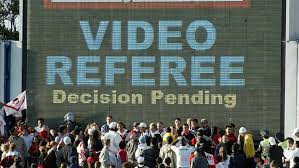By Andrew Warshaw in Cardiff
March 6 – In what new FIFA president Gianni Infantino described as an historic move, football’s lawmakers have finally given the green light for trialing video technology in live matches though much still needs to be done before the innovation becomes part of the fabric of the game.
The use of video assistant referees for “game-changing decisions” will begin no later than the 2017-18 season. If approved, it could be in force in time for the Euro 2020 finals.
The news was announced after Saturday’s meeting of the International Football Association Board (IFAB) in Cardiff, the first official overseas function for Infantino who used the start of his FIFA presidency to herald a new era in helping officials deal with contentious decisions in similar vein to other sports like rugby and tennis.
Experiments will be carried out over a two-year period before a final decision is taken on whether to adopt the technology permanently.
Initially tests will be in private before moving to a live pilot phase, with 12 associations and one confederation – understood to be CONMEBOL – already expressing an interest.
The use of video technology would be restricted to contentious goals, penalties, sendings off and cases of mistaken identity.
“We have taken really a historic decision for football,” Infantino said. “FIFA and IFAB are now leading the debate and not stopping the debate. We have shown we are listening to the fans, the players.”
It is four years since IFAB, which governs the rules of the game and comprises FIFA and the four British associations, approved the introduction of goalline technology, which was used at the 2014 World Cup. Any extension of scientific aids for referees was initially ruled out but Infantino, whose former boss at UEFA Michel Platini had to be dragged kicking and screaming into the modern age, said it was time to extend goalline technology to other areas of the game.
“We are applying commonsense. Of course we have to be cautious but we are also open to taking concrete measures,” said the former UEFA general secretary a week after taking over from Sepp Blatter.
“We cannot close our eyes to the future but it doesn’t mean to say it will work. The flow of the game is crucial. We cannot put that in danger. That is why we have to be open to test.”
The crucial next step will be to select the leagues to conduct the necessary experiments and agree on exactly how the system will work.
Jonathan Ford, general secretary of the Welsh FA which hosted Saturday’s summit, described the decision to give the green light to video technology as “the most fundamental and historic meeting” in IFAB’s 30-year history.
But he cautioned against acting too swiftly. It still has to be decided whether experiments should be conducted with a ‘man in a van’ or whether the referee should liaise via audio link with the video assistant.
“We are not quite ready,” said Ford. “It is a lot more complicated when you look at it. The likelihood is we will test off-line first – ‘hermetically sealed’ we call it – to make sure the protocols are right before we switch to live testing. Above all we don’t want to spoil the fluidity or beauty of the game.”
In the most significant rewriting of the laws of the game for more than a century, IFAB also agreed to modify the so-called “triple punishment” of sending-off, penalty and suspension for denying a goal-scoring opportunity. Players will in future be cautioned rather than sent off for less serious fouls in the box.
And from June 1, referees will have the power to red card players for fighting in the tunnel or on the pitch before a match starts. Any players involved in that kind of behaviour at this summer’s European championships in France now face being sent off before the ball has even been kicked.
Contact the writer of this story at moc.l1743772833labto1743772833ofdlr1743772833owedi1743772833sni@w1743772833ahsra1743772833w.wer1743772833dna1743772833

